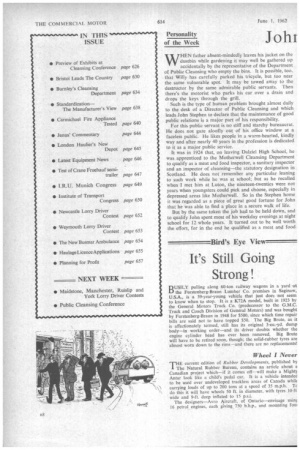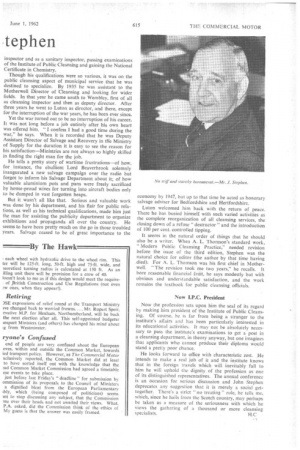Johr tephen
Page 42

Page 43

If you've noticed an error in this article please click here to report it so we can fix it.
HEN father absent-mindedly leaves his jacket on the dustbin while gardening it may well be gathered up accidentally by the representative of the Department of Public Cleansing who empty the bins. It is possible, too, that Willy has carefully parked his tricycle, but too near the same vulnerable spot. It may be towed away to the destructor by the same admirable public servants. Then there's the motorist who parks his car over a drain and drops the keys through the grill.
Such is the type of human problem brought almost daily to the desk of a Director of Public Cleansing and which leads John Stephen to declare that the maintenance of good public relations is a major part of his responsibility.
For this public servant is no stiff and starchy bureaucrat. He does not gaze aloofly out of his office window at a faceless public. He likes people in a warm-hearted, kindly way and after nearly 40 years in the profession is dedicated to it as a major public service.
It was in 1924 that, on leaving Dalziel High School, he was apprenticed to the Motherwell Cleansing Department to qualify as a meat and food inspector, a sanitary inspector and an inspector of cleansing—the statutory designation in Scotland. He does not remember any particular leaning to such work while he was at school; but as he recalled when I met him at Luton, the nineteen-twenties were not years when youngsters could pick and choose, especially in depressed areas like Motherwell. So in the Stephen home it was regarded as a piece of great good fortune for John that he was able to find a place in a secure walk of life.
But by the same token the job had to be held down, and to qualify John spent most of his weekday evenings at night school for 12 whole years. It turned out to be well worth the effort, for in the end he qualified as a meat and food
inspector and as a sanitary inspector, passing examinations of the Institute of Public Cleansing and gaining the National Certificate in Chemistry.
Though his qualifications were so various, it was on the public cleansing aspect of municipal service that he was destined to specialize. By 1935 he was assistant to the Motherwell Director of Cleansing and looking for wider fields. In that year he came south to Wembley, first of all as cleansing inspector and then as deputy director. After three years he went to Luton as director, and there, except for the interruption of the war years, he has been ever since.
Yet the war turned out to be no interruption of his career. It was not long before a job entirely after his own heart was offered him. "I confess I had a good time during the war," he says. When it -is recorded that he was Deputy Assistant Director of Salvage and Recovery in tire Ministry of Supply for the duration it is easy to see the reason for his satisfaction—Ministries are not always so highly skilled in finding the right man for the job.
He tells a pretty story of wartime frustrations—of how, for instance, the ebullient Lord Beaverbrook solemnly inaugurated a new salvage campaign over the radio but forgot to inform his Salvage Department about it; of how valuable aluminium pots and pans were freely sacrificed by house-proud wives for turning into aircraft bodies only to be dumped in vast forgotten heaps.
But it wasn't all like that. Serious and valuable work was done by his department, and his Hair for public relations, as well as his technical qualifications, made him just the man for assisting the publicity department to organize exhibitions and propaganda all over the country. He seems to have been pretty much on the go in those troubled years. Salvage ceased to be of great importance to the
economy by 1947, but up to that time he acted as honorary salvage adviser for Bedfordshire and Hertfordshire.
Luton welcomed him back with the return of peace. There he has busied himself with such varied activities as the complete reorganization of all cleansing services, the closing down of a refuse " destructor " and the introduction of 100 per cent, controlled tipping.
It seems in the natural order of things that he should also be a writer. When A. L. Thomson's standard work, "Modern Public Cleansing Practice," needed revision before the issue of the third edition, Stephen was the natural choice for editor (the author by that time having died), For A. L. Thomson was his first chief in Motherwell. "The revision took me two years," he recalls. It bore reasonable financial &tilt, he says modestly but with obvious and understandable satisfaction, and the work remains the textbook for public cleansing officials.
Now I.P.C. President
Now the profession sets upon him the seal of its regard by making him president of the Institute of Public Cleansing. Of course, he is far from being a stranger to the institute's affairs and has been particularly interested in its educational activities. It may not be absolutely necessary to pass the institute's examinations to get a post in a cleansing department, in theory anyway, but one imagines that applicants who cannot praduce their diploma would stand a pretty poor chance.
He looks forward to office with characteristic zest. He intends to make a real job of it and the institute knows that in the foreign travels which will inevitably fall to him he will uphold the dignity, of the profession as one of its distinguished representatives. The annual conference is an occasion for serious discussion and John Stephen deprecates any suggestion that it -is merely a social gettogether. There's a strict " no treating" rule, he tells me, which, since he hails from the Scotch country, may perhaps be taken as a measure of the seriousness with which he views the gathering of a thousand or more cleansing
specialists. H.0






































































































































































